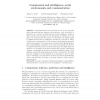Free Online Productivity Tools
i2Speak
i2Symbol
i2OCR
iTex2Img
iWeb2Print
iWeb2Shot
i2Type
iPdf2Split
iPdf2Merge
i2Bopomofo
i2Arabic
i2Style
i2Image
i2PDF
iLatex2Rtf
Sci2ools
87
Voted
AGI
2011
2011
Compression and Intelligence: Social Environments and Communication
Compression has been advocated as one of the principles which pervades inductive inference and prediction - and, from there, it has also been recurrent in definitions and tests of intelligence. However, this connection is less explicit in new approaches to intelligence. In this paper, we advocate that the notion of compression can appear again in definitions and tests of intelligence through the concepts of ‘mindreading’ and ‘communication’ in the context of multi-agent systems and social environments. Our main position is that two-part Minimum Message Length (MML) compression is not only more natural and effective for agents with limited resources, but it is also much more appropriate for agents in (co-operative) social environments than one-part compression schemes - particularly those using a posterior-weighted mixture of all available models following Solomonoff’s theory of prediction. We think that the realisation of these differences is important to avoid a naive v...
Related Content
| Added | 24 Aug 2011 |
| Updated | 24 Aug 2011 |
| Type | Journal |
| Year | 2011 |
| Where | AGI |
| Authors | David L. Dowe, José Hernández-Orallo, Paramjit K. Das |
Comments (0)

